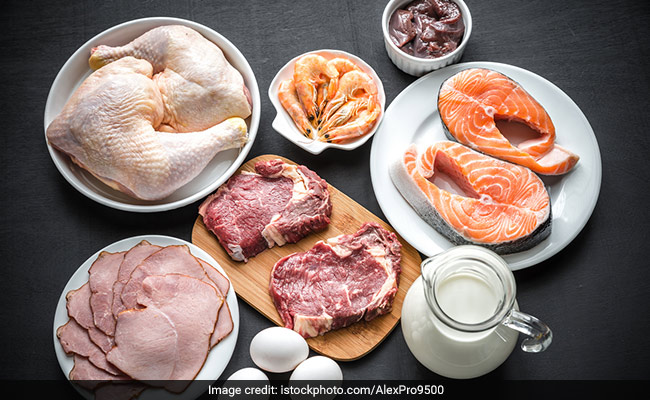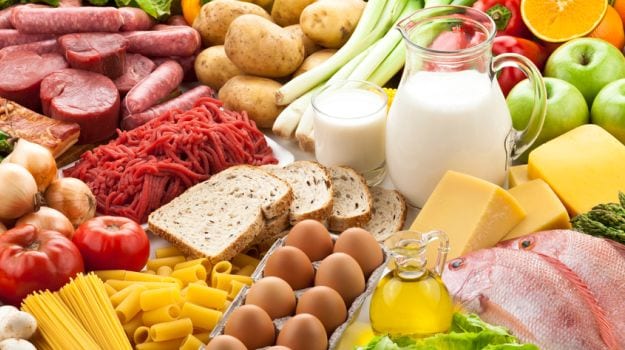Given the weight loss wave that is sweeping the world, there is a lot of demand for high protein foods that are also low in carbohydrates. However, there is a lot of confusion regarding which foods one should include in their diets, and which ones they should exclude. It is important to remember that not all bodies are alike. This means that your body type and body goals are different than the next person, which demands for a tailor-made diet plan made just for you. It's advisable to consult a certified nutritionist who can help you draw up a diet chart according to your needs and weight loss goals.Also Read: 6 Excellent Sources of Vegetarian Protein for Your Daily Diet
How Much Protein Do You Need?
Simply loading up on a whole lot of protein is not going to help you. You need to determine exactly how much protein your body needs and how much you are currently consuming. Moreover, the amount of protein you need to consume per day depends on your body composition and total body weight. According to the US Department of Agriculture (USDA), every person above the age of 19 must consume 0.8 grams of protein per kilogram of their body weight, per day.
This means that you will get your daily amount of protein intake by multiplying 0.8 with your total body weight. This is the amount that is adequate to maintain the lean muscle mass of your body and also keep you satisfied and full for longer. It's also important to find out the percentage of calories that you should be getting from proteins. This will generally depend on your body goals and whether you are looking to gain or lose weight.Also Read: Dietary Protein Benefits: How It Can Help You Gain Muscles
 High-protein low carbohydrate foods: Eggs, fish, chicken are great sources of proteins.
High-protein low carbohydrate foods: Eggs, fish, chicken are great sources of proteins.Benefits Of A Diet Rich In Proteins
Your organs, tissues, muscles and hormones are all made up of proteins. This is why they are known as the building blocks of life. Proteins do most of the work inside our body cells and are important for building the structure and functions of our organs and tissues. All proteins are made of 22 building blocks, known as amino acids. Of these 22 proteins, nine are essential amino acids and must be given to the body through your diet, as your body is incapable of making them itself.
A lot of protein in your diet comes from lean meats like eggs, fish, chicken, etc. Some plant-sources of proteins are also available for vegetarians, but these are not sufficient to meet your body's daily requirements. This is why you need to keep a balance between plant-based and animal-based protein sources to meet your body's protein demands.
Also Read: 6 Signs You Are Eating Too Much Protein
A diet high in proteins has a number of health benefits, including maintaining a healthy body weight and losing extra fat. A diet rich in proteins and low in carbohydrates can help you bulk up faster and workout with more energy. Moreover, protein-rich foods have also been known to stabilise blood sugar levels, eliminating the need for you to eat more frequently. This effectively leads you to consume fewer calories. Protein-rich foods have also been found to improve learning abilities and concentration, as well as reduce brain fog. Proteins also stimulate absorption of nutrients from food.
Top 10 Low-Carbohydrate High-Protein Foods
You can effectively gain a greater percentage of calories from proteins as compared to carbohydrates, by being just a little mindful of what exactly you are putting on your plate. Although removing an entire food group of carbohydrate from your diet may have harmful repercussions, there are certain foods that you can eat to ensure that you consuming more proteins than carbs on a daily basis. Moreover, it's important to make sure that the foods you eat have carbs in the form of fibre and not sugar.Also Read: Whey or Soy, Which Protein is Good For Health?
Here are top 10 foods that are rich in proteins and low in carbs:
1. Eggs: Your favourite breakfast food is highly nutritious and full of good quality proteins. One large boiled egg contains almost no carbs and 13 gm of proteins. They are very versatile and can be included in a number of ways in your daily diet.
 High Protein Low Carb Foods: Eggs contain almost no carbs
High Protein Low Carb Foods: Eggs contain almost no carbs2. Walnuts: One of the healthiest nuts out there is the walnut, a 100-gm serving of which contains 15 gm of proteins. So, snack on these brain-shaped nuts for a protein kick.
3. Chickpeas: These high-fibre legumes are a hit with gym-goers as just a 100-gm serving of this healthy snack contains 19 gm of proteins. Moreover, 68% of the total carb content of chickpeas is fibre, which makes it a filling food.
4. Tofu: It's a favourite food among vegetarians and vegans. A 100-gm serving of tofu contains 9 gm of high-quality protein and zero carbs.
5. Lentils: A 100-gm serving of boiled lentils contains 9 gm of protein. Moreover, the same amount of lentils also has 8 gm of dietary fibre.
6. Pistachios: These nuts are great to munch on as mid-meal snacks. A 100-gm serving of pistachios contains 20 gm of protein and 10 gm of dietary fibre. So, go ahead and add pistachios to your breakfast smoothies and desserts.
7. Oats: One of the healthiest breakfast foods is oats, which contains high-quality fibre and almost 17 gm of protein, per 100 gm of its serving. Make sure you only opt for sugar-free oatmeal to avoid consuming unwanted calories.
8. Black Beans: These are one of the best diet foods for people looking to eat protein-rich meals. A 100-gm black bean serving contains 21 gm of protein and high amounts of dietary fibre.
9. Yogurt: Also, one of the best low-fat dairy sources of protein, yogurt is a popular choice among fitness lovers. It contains no carbohydrates and 10 gm of protein per 100 gm. It's delicious and also great for your digestive health.
 High Protein Low Carb Foods: Yogurt is the best low-fat dairy source of protein
High Protein Low Carb Foods: Yogurt is the best low-fat dairy source of protein10. Tuna: The saltwater fish tuna is one of the best sources of lean proteins, as it has zero carbohydrates and a whopping 30 gm of proteins per 100 gm of serving.
These are just some of the best high-protein low carbohydrate foods that you should include in your diet for healthy meals. It is still recommended to consult an expert nutritionist before starting on any diet, especially if it's a fad diet.








